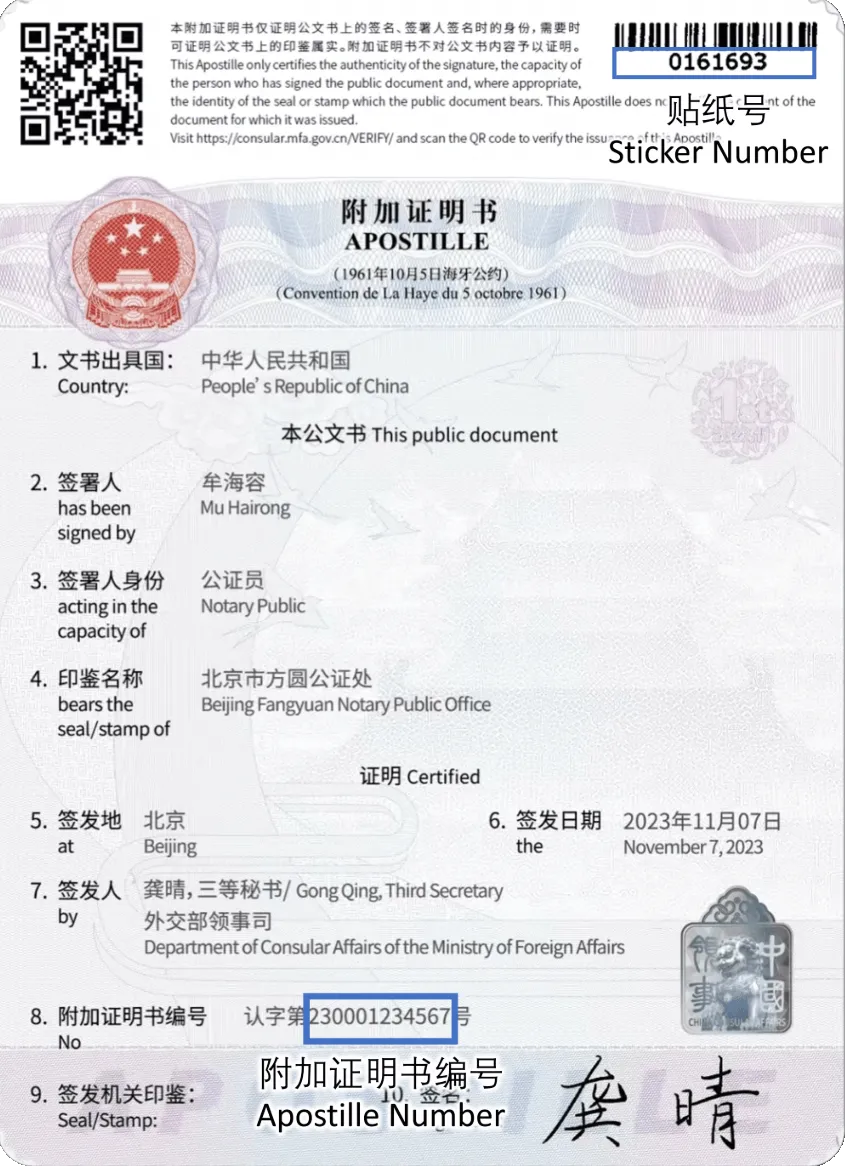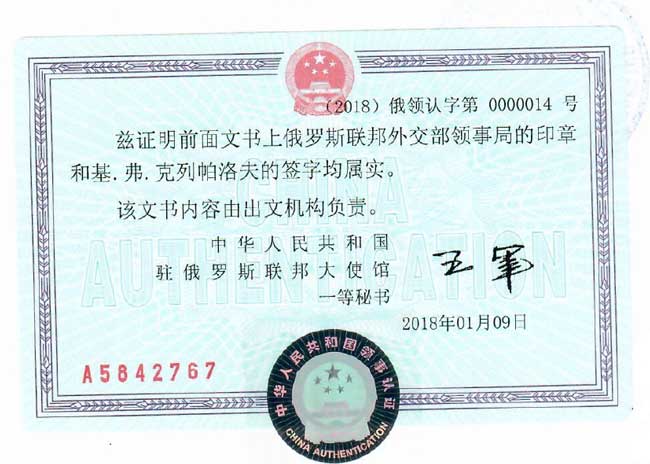
Schmidt & Schmidt компаниясы Қытайда берілген құжаттарды апостильдеу (апостиль қою) бойынша қызметтер ұсынады.
Апостиль — ресми құжаттың түпнұсқалығын растайтын арнайы мөртабан (мысалы, туу, неке немесе қайтыс болу туралы куәлік, сот шешімі, тізілімнен үзінді немесе нотариаттық куәландыру). Апостильді мемлекеттік органдар, жергілікті өзін-өзі басқару органдары, сондай-ақ мемлекет арнайы өкілеттік берген ұйымдар берген құжаттарға қоюға болады.
Қытайдағы апостиль «Apostille» деген атауы бар жапсырма-стикер түрінде рәсімделеді және онда 1961 жылғы Гаага конвенциясына француз тіліндегі сілтеме (Convention de La Haye du 5 octobre 1961) көрсетіледі. Апостиль мәтіні ағылшын және қытай тілдерінде беріліп, сондай-ақ апостиль нөмірі мен түпнұсқалығын тексеруге мүмкіндік беретін QR-кодты қамтиды. Стикерге арнайы күміс түсті мөр бекітіледі.
Апостиль мөртабаны тек құжат берілген мемлекеттің аумағында ғана қойылады.
2023 жылға дейін шетелдік құжаттарды ҚХР аумағында пайдалану және қытайлық құжаттарды шет елдерде қолдану үшін консулдық заңдастыру рәсімінен өту қажет болатын. Бұл аударманы уәкілетті аудармашы арқылы орындау, аударманы нотариалды куәландыру, құжатты ҚХР Сыртқы істер министрлігінің кеңсесінде растау және одан кейін құжатты тағайындалған елдің консулдығында заңдастыру сияқты бірнеше кезеңнен тұратын күрделі рәсім еді.
Гаага конвенциясын ратификацияламаған мемлекеттер үшін ҚХР-дан берілген құжаттарды пайдалану кезінде бұл тәртіп бүгінгі күнге дейін сақталып келеді.
Қытай 2023 жылғы 8 наурызда құжаттарды жеңілдетілген тәртіппен заңдастыру туралы Гаага конвенциясына қосылды, ал 2023 жылғы 7 қарашадан бастап конвенция күшіне енді.
Қытайда берілген және апостильмен расталған құжаттар 1961 жылғы Гаага конвенциясына сәйкес, Гаага конвенциясына қатысушы барлық мемлекеттерде мойындалады және консулдық легализация сияқты қосымша куәландыруды қажет етпейді. Бұл құжаттарды растауға кететін шығындар мен уақытты едәуір азайтады. Қазіргі таңда конвенцияға 125 мемлекет қосылған.
Қытайда берілген құжаттар Қазақстанның мемлекеттік органдары мен соттары тарапынан тек апостиль арқылы легализацияланып, кейін қазақ немесе орыс тіліне аударылып нотариуспен расталған жағдайда ғана мойындалады. Осылай расталған Қытай құжаты Қазақстанда заңды күшке ие болады.
Қытайдағы құжаттарға апостиль қоюға шектеу
Қытайдың Апостиль конвенциясына қосылуына қарсы пікірін 2023 жылғы 8 қыркүйекте ресми түрде Үндістан білдірді. Сондықтан Қытай Халық Республикасы мен Үндістан бір-бірінің апостильдерін мойындамайды. Сонымен қатар, Конвенцияға қосылған кезде Пекин ресми түрде мойындайтын мемлекеттердің құжаттарына ғана апостиль қабылдайтынын мәлімдеді. Сол себепті ҚХР мен Косово арасында апостиль рәсімі қолданылмайды.
Гонконг пен Макаодағы апостиль
Конвенцияға қосылған кезде ресми Пекин Қытай Халық Республикасының арнайы әкімшілік аймағы – Гонконг пен Макаода, олар Апостиль конвенциясына қосылған кезде ҚХР құрамына енбегендіктен, апостиль рәсімі материктік Қытайдағыдан өзгеше болып қала беретінін атап көрсетті. Дегенмен, Гонконг пен Макао да апостильді тек ҚХР орталық билігі мойындаған мемлекеттердің құжаттарына ғана қояды.
Қытайда берілген құжаттар Қазақстан Республикасының мемлекеттік органдары мен соттары тарапынан тек апостиль арқылы легализацияланып, кейін аударылып, нотариуспен расталған жағдайда ғана мойындалады. Осылай расталған Қытай құжаты Қазақстанда заңды күшке ие болады.
ҚХР-де апостильдеудің міндетті реквизиттері
- Француз тіліндегі жазу – Apostille және 1961 жылғы конвенцияға сілтеме;
- мемлекеттің атауы (ҚХР);
- ресми құжатты немесе нотариалды сертификатты қол қойған адамның аты-жөні;
- ресми құжатты немесе нотариалды сертификатты қол қойған адамның лауазымы;
- ресми құжатқа немесе нотариалды сертификатқа мөр немесе штамп қойған ұйымның атауы;
- апостиль қою орны;
- апостиль қою күні;
- апостильді жүзеге асырған органның атауы;
- апостиль нөмірі;
- апостильді жүзеге асырған органның мөрі;
- апостильді жүзеге асырған уәкілетті тұлғаның қолы.
Қытайдағы апостильдер тізілімі
Қытайда электрондық апостильдер тізілімі жұмыс істейді. Нөмір бойынша апостильдердің шынайылығын онлайн режимде тексеруге болады.
Құжаттарға апостиль қоюға құқық берілген Қытай мемлекеттік органдары
Қытайда құжаттарға апостиль қоюға құқылы орган – ҚХР Сыртқы істер министрлігі.
Министрліктің құрамында апостиль құжаттарға Легализация қызметі қояды, сондай-ақ тиісті әкімшілік бірліктер шегінде әр провинциядағы Сыртқы істер басқармаларының аймақтық бөлімшелері апостиль қоя алады.
Қытайдағы апостиль

| растауға болады | растауға болмайды |
|---|---|
|
|
Қытайда құжаттарға апостиль қою тәртібі
Қадам 1: Нотариалды растау
Маңызды кезең – құжатты нотариалды растау. Қытайда апостиль ешқашан құжаттың оригиналына қойылмайды, тек нотариалды көшірмелерге қойылады. Нотариалды растаудың екі түрі бар: бір реттік және қос реттік растау. Растау түрі құжатты қолдану елінен тәуелді, сондықтан нотариусқа алдын ала құжат қай елде қолданылатынын хабарлау маңызды, ол құжатты дұрыс дайындай алады.
Қытайдағы нотариус тек қытай тілінде берілген құжатты растай алады, шетел тіліндегі құжаттарды растай алмайды. Сондықтан оригинал мәтіні қытай тілінде болуы маңызды, әсіресе сенімхаттар немесе халықаралық мектеп пен университеттердің сертификаттарын растау кезінде. Университет немесе мектеп ағылшын тілінде құжат берсе де, нотариалды растауға тек қытай тіліндегі оригинал құжат қолданылады.
Шетел тіліне аударма - нотариалды сертификаттың міндетті бөлігі, оны шетелде қолдану үшін дайындайды. Соңында сізге бір нотариалды сертификат беріледі, онда нотариалды растаған құжат пен нотариалды аударма біріктіріледі, оған кейін бір апостиль қойылады.
Бірақ! Аударма шетелде әрдайым қабылданатынына сенімді болу керек емес. Қабылдаушы органның талаптарын алдын ала тексеру маңызды, көбіне (және жиі) елдегі сертификацияланған аудармашы немесе нотариус арқылы қосымша нотариалды аударма жасау талап етіледі.
Кейбір қытай құжаттарының жарамдылық мерзімі тек 3 ай, егер аударма талаптарын алдын ала тексермесеңіз, құжатты қайта сұрап, растау, легализациялау және жіберу қажет болуы мүмкін, бұл үлкен уақыттық және қаржылық шығындарға әкеледі.
Құжатты нотариалды растау мерзімі аударма көлеміне байланысты және әдетте шамамен 5 жұмыс күнін құрайды.
Ескерту: Егер құжат, мысалы, Цзянсу провинциясы, Уси қаласында берілсе, нотариалды көшірмесін (сертификат) Қытайдың басқа қаласында жасауға болады, БІРАҚ апостиль тек нотариалды бөлімшеге тіркелген Сыртқы істер министрлігінде қойылады.
Сертификаттарды, келісімшарттарды, инвойстарды және басқа коммерциялық құжаттарды нотариалды растау
Коммерциялық құжаттарды легализациялау рәсімі нотариус арқылы емес, Халықаралық сауданы қолдау кеңесі (CCPIT) арқылы жүргізіледі. Әр провинцияда өз кеңесі бар, құжатты берген компания немесе берілген жер бойынша хабарласу қажет. Құжат қытай тілінде шығарылуы тиіс, келісімшарттар мен басқа коммерциялық құжаттарда компания мөрі мен құрылтайшының қолы болуы қажет.
Мұндай құжаттарды легализациялау үшін бизнес-лицензия және қытай компаниясының құрылтайшысының ID картасы қажет. Кейін процедура нотариус арқылы растауға ұқсас жүргізіледі.
Қадам 2: Сыртқы істер министрлігінде апостиль қою
Апостиль қою үшін Сыртқы істер министрлігінде алдын ала жазылу қажет емес. Апостиль қою үшін нотариалды сертификат берілген аймақтың Сыртқы істер басқармасына келіп, электрондық кезек тәртібімен құжат тапсыру жеткілікті.
ҚХР Сыртқы істер министрлігінде апостиль қоюдың стандартты мерзімі — 5 жұмыс күні, алайда экспресс-қызмет тапсыру кезінде ол 3 жұмыс күніне дейін қысқаруы мүмкін (жеткізу уақыты есепке алынбайды).
Құжаттарды апостильге тапсыру кезінде жеке басыңызды растау қажет. Егер апостильге құжатты ұйым тапсыратын болса, құжатты тапсыратын тұлға сенімхаттың оригиналын және құжат иесінің қолданыстағы паспортының көшірмесін көрсетуі тиіс.
Қытайдың электрондық апостилі
2025 жылғы 18 маусымнан бастап Қытайда пилоттық режимде электрондық апостиль (e-Apostille) енгізілді. Цифрлық түрде растауға болатын алғашқы құжат – Қытай халықаралық сауда ынтымақтастығын қолдау комитеті шығарған электрондық «Шығу сертификаты». Мұндай сертификатқа ие тұлғалар оны ҚХР Сыртқы істер министрлігінің Легализация қызметіне тапсыруы керек.
Келешекте бұл процедура ҚХР-дың басқа құжат түрлеріне кезең-кезеңімен таратылады. Қазіргі уақытта процедура тек жергілікті айди картасы бар Қытай азаматтарына қолданылады.
Шетелде қолдану үшін қытай білім құжаттарын легализациялау
Шетелде оқитын немесе жұмыс істейтін адамдар өздерінің білім және оған байланысты құжаттарының шынайылығын растау үшін апостильге өтініш беруі қажет. Осы растаған құжатты Гаага конвенциясына қосылған 125 ел мен аймақта толық көлемде қолдануға болады.
Қытайда берілген білім құжаттары, мысалы, мектеп аттестаттары, университет дипломдары, академиялық анықтамалардан үзінділер, қабылданғандығы туралы куәліктер және басқа мектеп немесе университет құжаттары, апостильсіз шетелде заңды күшке ие болмайды. Мысалы, шетелдік дипломыңызға апостиль магистратураға немесе докторантураға түсу үшін қажет болуы мүмкін.
Академиялық сертификатқа апостиль алу үшін сертификаттың заңды және күшінде екеніне, тиісті оқу орны шығарғанына және ресми процедуралар бойынша алынғанына көз жеткізу қажет. Әдетте келесі әрекеттерді орындау қажет:
- Академиялық анықтаманы берген оқу орнына барып, құжаттың оригиналы немесе ресми көшірмесін алу. Көшірме ресми мөр мен оқу орнының қолын қамтитындығына және оригиналмен сәйкес екеніне көз жеткізу.
- Академиялық сертификатты білім департаментіне сертификаттау үшін тапсыру. Білім департаменті академиялық сертификаттарды тексеріп, олардың заңды мәртебесін растайды. Бұл процедура үшін кейде қосымша құжаттар талап етілуі мүмкін.
- Қажет болған жағдайда үміткерлерден академиялық сертификаттың көшірмесін Қытайдың Әділет министрлігіне нотариалды растау үшін сұрауы мүмкін.
- Білім құжаттарын Сыртқы істер министрлігіне тапсыру. Сыртқы істер министрлігі білім құжатын ресми Апостиль мөрімен растайды.
- Расталған академиялық сертификатты мақсатты елдің Қытайдағы елшілігіне немесе консулдығына соңғы сертификаттау үшін жіберу.
Мемлекеттерде академиялық сертификаттарды сертификаттау талаптары әртүрлі болуы мүмкін, сондықтан алдын ала кәсіби агенттіктермен немесе мақсатты елдің елшіліктерімен кеңесу ұсынылады.
Қытайдан алынған құжаттарды консулдық легализациялау
Егер қытай құжаты Гаага конвенциясын мойындамайтын елде, мысалы БАӘ немесе тізімге кірмеген басқа елдерде қолданылатын болса, онда ол құжат консулдық легализациядан өтуі қажет. Апостильді қабылдайтын және қолданатын елдердің толық тізімін осында табуға болады.
Консулдық легализация — бұл құжаттың шынайылығын немесе заңды күшін растайтын процесс, сол арқылы шетел мемлекетінің құқық жүйесі оны толық заңды құжат ретінде мойындайды. Бұл процесс құжат қолданылатын елдің дипломатиялық немесе консулдық өкілдігі арқылы жүзеге асырылады.
Қытайда берілген құжатты консулдық легализациялау үшін оның Қытай Халық Республикасының нотариусы тарапынан шетелде қолдануға арналған түрде расталуы міндетті. Нотариус оригинал құжат негізінде нотариалды расталған көшірме мен оның шынайылығын растайтын нотариалды құжат береді. Нотариалды расталған құжат нотариус орналасқан жердегі Сыртқы істер басқармасы арқылы расталады. Осыдан кейін құжат мақсатты елдің консулдығында легализациялана алады.
Консулдық легализация — апостильге қарағанда күрделі, ұзақ және қымбат процедура. Апостиль әдетте бір кезеңде рәсімделсе, консулдық легализация бірнеше алдын ала растауды қажет етеді, содан кейін ғана құжат мақсатты елдің Қытайдағы елшілігі немесе консулдығында ресми түрде расталады.
Әдетте құжат консулдыққа тапсыру алдында мақсатты елдің ресми тіліне аударылуы қажет. Дипломатиялық өкілдік құжатты қалай растау керегін өз бетінше шешеді.
Құжат тек сол елдің аумағында заңды күшке ие болады, консулдық мөрі қойылған елде ғана қолдануға болады және басқа елдерде жарамсыз.
Құжаттың консулдық легализациясының мерзімі әдетте шектелмеген, бірақ құжаттың өзіне қатысты кейбір шектеулер қойылуы мүмкін.

Қытайда құжаттарды консулдық легализациялау тәртібі
Қытайдың мемлекеттік немесе провинциялық органдары шығарған немесе қытай нотариусы рәсімдеген және Гаага конвенциясына қатыспайтын елде қолдануға арналған құжатты:
- құжат қолданылатын елдің тілінде уәкілетті аудармашы арқылы аудару;
- аударманы Қытайда нотариус арқылы растау;
- құжатты Қытай Сыртқы істер министрлігінде растау;
- құжатты мақсатты елдің Қытайдағы консулдығында легализациялау.
Осы рәсімдерден өткеннен кейін ғана консулдық легализация аяқталады, және құжат мақсатты елде қолдануға жарамды болады.
Апостиль мен консулдық заңдастыру арасындағы айырмашылықтар
Апостиль мен консулдық заңдастырудың ортақ белгісі – олар ресми құжаттың басқа елдің мекемелерінде қолданылуы үшін шынайылығын растайды. Алайда олардың арасында елеулі айырмашылықтар бар.
| Апостиль | Консулдық заңдастыру | |
|---|---|---|
| Шындық | Тек Гаага конвенциясына қатысушы елдер арасында ғана қолданылуы мүмкін. | Гаага конвенциясына қатыспайтын немесе қатысушы еместігінен бір немесе екі ел арасында, немесе бір тарап екінші тараптың қосылуына қарсы болған жағдайда қолданылады. |
| Алу қиындығы | Орташа. Апостиль алу үшін құжат берілген елдің уәкілетті органыға жүгіну қажет. | Жоғары. Консулдық заңдастыру үшін құжат берілген елдің әртүрлі органдарына және консулдықтарға жүгіну қажет |
| Алдын ала растау | Қажет емес. | Қажет. Құжатты берген органнан алдын ала растау қажет. |
| Мақсат елінің консулдығында заңдастыру | Мақсат елінің консулдығына жүгіну қажет емес. | Заңдастырудың соңғы кезеңі әдетте құжат берілген елде мақсат елінің консулдығында өтеді. |
Қытайдан құжаттарды алу
Кейде азаматтық хал актілерінің құжаттары жоғалуы немесе зақымдалуы мүмкін, немесе құжаттардың өзекті көшірмелерін алу қажет болады. Мұндай жағдайда құжаттардың дубликаттарын алу қажет. Бұл процедурада Қытайдан шыққан адамдар жиі қиындықтарға тап болады. Біздің сервис Қытайдан құжаттарды қашықтықтан алуға мүмкіндік береді және құжатты әлемнің кез келген нүктесіне курьерлік жеткізуге болады.
Қытайдан құжаттарды нотариалды аудару
Қытайда жеке нотариалды аударма қызметі жоқ — аударма тек нотариалды сертификат (公证书) құрамында заңды күшке ие болады.
Қытайдағы қарапайым немесе «сертификатталған» аудармашылар жасаған аудармалар нотариалды сертификат құрамына кірмесе, шетелде мойындалмайды.
Сондықтан, егер мақсатты елге нақты аударма қажет болса, оны құжат қолданылатын елде, сол елдің талаптарына сәйкес жасау ұсынылады.
Аудармаға апостиль қойылуы керек пе?
Бір елде берілген және басқа елде қолдану қажет кез келген шетелдік құжат легализациялануы тиіс. Қытайда жасалған және апостиль қойылған аударма құжат шетелдік құжат мәртебесінде қалады, яғни оған қайта апостиль қою қажет. Сондықтан көптеген органдар Қытайда нотариалды расталған аудармаларды қабылдамауы мүмкін. Мұны болдырмау үшін аудармаларды құжат қолданылатын елде жасау ұсынылады.
























































